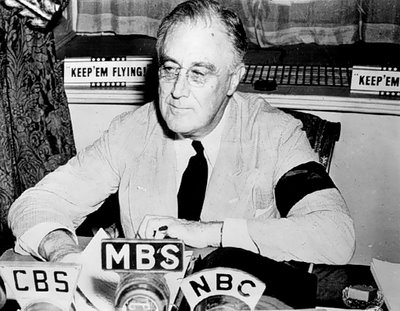
Past US Presidents Tried to Rally Public During Wartime
By Jim Malone VOA
Washington
12 January 2007
You can Listen to Malone report if your prefer. It is interesting.
U.S. President George Bush faces a difficult challenge, as he tries to win support for a new strategy in Iraq, even as opinion polls indicate much of the public no longer believes the war is winnable. But as VOA National correspondent Jim Malone reports, U.S. presidents have often faced unique challenges during wartime.
During the American Civil War in the 1860's, President Abraham Lincoln came under intense criticism for the high number of casualties suffered by northern troops trying to turn back the southern rebellion. President Lincoln won re-election in 1864, defeating one of his former generals, George McClellan.
During the early days of World War II, President Franklin Roosevelt used his popular fireside radio chats to rally public support, even when there was discouraging news from the battlefield.
President Franklin Delano Roosevelt
ROOSEVELT: "Soon we, and not our enemies, will have the offensive. We, not they, will win the final battles and we, not they, will make the final peace."
President Harry Truman faced a similar challenge during the Korean War in the early 1950's, after early success on the battlefield ground to a stalemate.
TRUMAN: "Now, many persons, even some who applauded our decision to defend Korea, have forgotten the basic reason for our action. It is right for us to be in Korea now. It was right last June [1950]. It is right today."
In the 1960's and 1970's, four U.S. presidents had to deal with the war in Vietnam.
Shortly before his death in 1963, President John Kennedy discussed the prospects for withdrawing U.S. troops from Vietnam within a year or two with his national security adviser, McGeorge Bundy.
President Lyndon Johnson
No president had more at stake in Vietnam than Lyndon Johnson. Under his leadership, the war quickly expanded in the mid-1960's. But as more troops were sent in with mixed results on the battlefield, discontent over the war began to grow at home and took a toll on President Johnson's political support.
In March of 1968, Mr. Johnson shocked the country when he announced he would not seek re-election.
JOHNSON: "With our hopes and the world's hopes for peace in the balance every day, I do not believe that I should devote an hour or a day of my time to any personal partisan causes, or to any duties other than the awesome duties of this office, the presidency of your country."
President Bush faces a similar challenge in trying to rebuild support for the war in Iraq.
President George Bush concludes his address to the nation from the White House Library, 10 Jan 2007
"Now, America is engaged in a new struggle that will set the course for a new century," said Mr. Bush. "We can and we will prevail."
While public support for the war in Vietnam eroded over a period of years, the decline in support for the effort in Iraq has developed more quickly.
Professor John Mueller of Ohio State University has studied the impact of war on public opinion.
"When [public] support in Iraq had gotten down to 50 percent or so, about 2,000 Americans had died," he noted. "When support of the Vietnam War had gotten down to about 50 percent, about 20,000 Americans had died. So, that suggests that people are much less willing to expend lives on this venture in Iraq than they were in the one in Vietnam."
In his recent address to the nation on Iraq, President Bush said the U.S. commitment there is not open-ended, but he urged Americans to give his new strategy a chance.
Public opinion experts question how long the public is willing to wait to see progress in Iraq.
Christopher Gelphi (Jell'-pee) is a political science professor at Duke University in North Carolina.
"If it takes a year or more for this increase in troops to start to have an effect, that is a real problem for the president," he explained. "If, on the other hand, we can see a real effect within the next couple of months, he might be able to turn things around."
The polls suggest President Bush has a lot of convincing to do. Recent surveys indicate about two-thirds of the public opposes the troops increase for Iraq, and about 70 percent disapprove of the president's handling of the war.

TSUUUNAAMIII!!
ReplyDelete